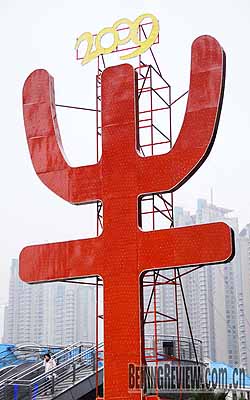|
Short text messages that included the Chinese character niu (ox) were the most popular New Year greetings during this Spring Festival.
|

|
|
BIG GREETING: A sculpture in the shape of Chinese character niu was erected in the Pudong area of Shanghai as a Spring Festival decoration this year (XINHUA) | Although symbolizing the Year of the Ox, the character niu refers to more than just an animal. It also has other connotations in meaning. In colloquial language, more popular in Beijing, niu is an adjective meaning "really outstanding." Usually, it is used in a humorous way by young Chinese.
More interestingly, as the pronunciation of the Chinese character niu is similar to that of the English word "new," people were creatively combining the two languages with messages of "Happy Niu Year."
The character niu is especially important to stock investors, as the bullish market is called niushi (shi means market) in Chinese. Having experienced a bearish 2008 and suffering from the backlash of the world economic crisis, the Chinese people hope that the Year of the Ox would herald a bullish market.
Li Fei, 35, an IT manager in Beijing, invested most of his savings in the stock market in 2008. He bought many decorations with the image of the ox before this Spring Festival, hoping they would bring him luck.
"I hang them in my home, my office and my car, and pray that the 2009 stock market is bullish," he said.
In some Spring Festival blessings, the Year of the Ox is described as a golden bull, and people hope that the golden bull could bring prosperity and good luck to China. History seems to point in that direction. In previous years of the ox, China went through some important events. For example, the People's Republic was founded in 1949 and China resumed sovereignty over Hong Kong in 1997.
A Chinese idiom niuzhuan qiankun, was also a favorite message over Spring Festival blessings, meaning embracing a change.
"We know that all the blessings are only a psychological comfort," said Li, who works in a foreign IT company in Beijing that has been severely affected by the world economic crisis. "To overcome difficulties we still need hard work and perseverance."
More than most of the animals in the Chinese zodiac, the ox is much loved as it is deemed to play an important role in people's lives. For example, in dictionaries about Chinese idioms or phrases, the entries that include the character niu total more than 140. As the character niu depicts things vividly, most of these phrases or idioms are used frequently in daily life.
In Chinese culture, the ox symbolizes a hardworking, loyal and down-to-earth character. People who work painstakingly or serve others wholeheartedly would be called lao huang niu, or old yellow cattle.
The niu character can, however, also have negative connotations. The idiom duiniu tanqin (play the lute to a cattle), means addressing the wrong audience, alluding that the ox is not so smart. Other negative words carrying the character niu include chuiniu (blow cattle), or big talk. The ox is also known to be stubborn, and can be used to refer to obstinate people. | 